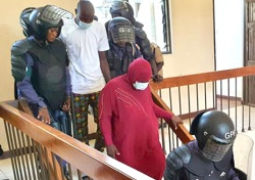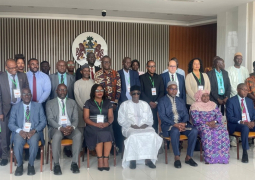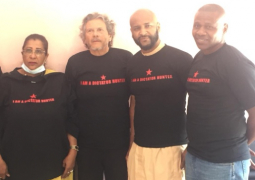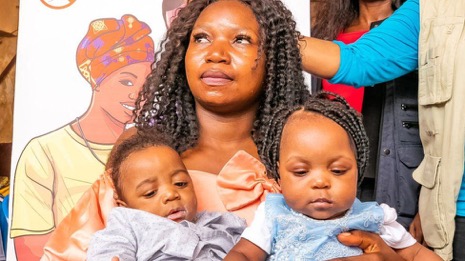
The symbolic first jab was given to a baby girl named Daniella at a health facility near Yaoundé on Monday.
Every year 600,000 people die of malaria in Africa, according to the World Health Organization (WHO).
Children under five make up at least 80% of those deaths.
Cameroon is offering the RTS,S vaccine free of charge to all infants up to the age of six months old.
Patients require a total of four doses. Health officials say these will be given at the same time as other routine childhood vaccines to make it easier for parents.
It comes after successful pilot campaigns in Kenya, Ghana and Malawi - where the vaccine caused a 13% drop in malaria deaths in children of eligible age, says Unicef.
The jab is known to be effective in at least 36% of cases, according to US researchers, meaning it could save over one in three lives.
While the rollout is undoubtedly a relief and a life-saver, its relatively low efficacy rate means that it is not a "silver bullet", argues Willis Akhwale at End Malaria Council Kenya.
But for medics it is an important additional tool in the fight against malaria alongside mosquito nets and malaria tablets. Using all three together potentially gives children 90% protection from malaria, one UK-led study estimates.
"We have a capacity to considerably reduce the number of cases and deaths from malaria and accelerate the elimination of the disease," Cameroonian doctor Shalom Ndoula, who helped to lead the vaccine rollout in his country, told BBC Newsday.
Development of the RTS,S vaccine has taken 30 years of research by the British drug-maker GSK.
The World Health Organization, which approved the vaccine, hailed the launch in Cameroon as a historic moment in the global fight against the mosquito-borne disease.
There was another breakthrough earlier this month, when Cape Verde became the first sub-Saharan African country in 50 years to be officially declared malaria-free by the global health body.
'Safe, effective and free'
Fears and doubts among some Cameroonians about the safety and efficacy of the doses have raised concerns about vaccine hesitancy.
"When people say we are being used as guinea pigs, that's not particularly true," Wilfred Fon Mbacham, who is a Cameroonian king and also a professor of public health biotechnology specialising in malaria, told BBC Newsday.
Source: BBC
Read Other Articles In Headlines
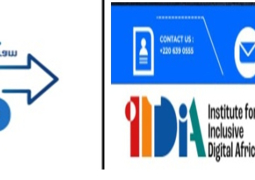
Gambia launches BANTABA 2.0, first real-time interoperable payment system
Dec 15, 2025, 11:20 AM
